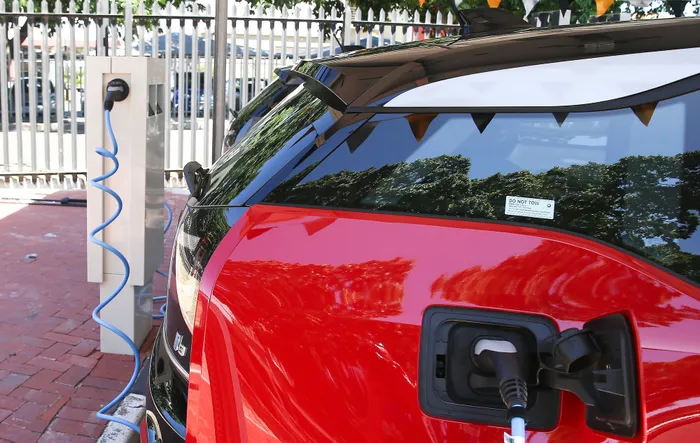South Africa’s electric vehicle ambition stuck in neutral
ELECTRIC VEHICLES

Panelists at a discussion on a South Africa's EV roadmap on Wednesday said the country's ambitions were hampered by infrastructure, energy uncertainty, policy developments, decarbonisation deadlines, fuel quality, import tariffs, and the pricing to suit the market.
Image: Leon Lestrade / Independent Newspapers
Banele Ginidza
South Africa, currently selling about 1 000 electric vehicles (EV) a year constituting 1% of the 13 million vehicles on the road, is still miles from realising its EV ambitions.
Panelists at a discussion on a South Africa's EV roadmap on Wednesday said the country's ambitions were hampered by infrastructure, energy uncertainty, policy developments, decarbonisation deadlines, fuel quality, import tariffs, and the pricing to suit the market.
They pointed to the high grid carbon intensity, which will have to be reduced to comply with Carbon Border Adjustment Mechanisms (CBAM) and other decarbonisation penalties.
The discussion was a reflection on the Norwegian experience, which has been in the fast lane to electrify its passenger car sales by 2025. In the first half of 2025, all-electric cars made up a record 94.3% of new car registrations in Norway.
In a bid to electrify road transport to help meet Norway’s climate commitments, the Norwegian parliament agreed on the National Transport Plan for 2018 – 2029 to have all new car sales as zero emissions by 2025.
In South Africa, the rollout of electric vehicles began with Mercedes-Benz’s hybrid C-Class in 2018, followed by Toyota’s Cross Hybrid in 2021 and BMW’s Plug-in Hybrid. Recently, Ford launched the Plug-in Hybrid Ranger in Silverton, Pretoria, showing manufacturers’ commitment to enter the evolving EV landscape.
Yet despite these introductions, the country’s trajectory appears daunting as less than 1 000 EVs were sold in 2024.
"The barriers to EV adoption remain the cost of EVs and that we need to talk about," said Saliem Fakir, executive director of the African Climate Foundation (ACF).
"Fossil fuel subsidies at the moment amount to R2.3 billion a year, that is according to the National Treasury statistics, that is another reason to look at this."
Hiten Parmar, executive director of the Electric Mission, said there had been a slow progression in the industry.
However, Parmar said from 2022 onwards, the EV industry had crossed the 1 000 milestone in every year and just in the first half of 2025 had already reached the 4 000 mark.
"This is still not where we need to be. We are still less than 1% of our total fleet of approximately 13 million vehicles in our roads," Parmar said.
"There is still work required items of that, but we do acknowledge the models from various manufacturers being introduced into our country and markets with difficult conditions like tariffs and existing structures in place."
He said the country's value proposition compared to other regions with automotive industries showed SA was certainly lagging behind with a need to have policy reform and really structuring the demand side and supply side regulations.
"Other economies are accelerating very quickly and SA is being left behind in terms of that. We need to advance the sector and take SA forward to the ambitions of the Automotive Master Plan where we want to be at 1% of global production," Parmar said.
"It is still a challenge where we export our vehicles because Europe has announced specific timelines in terms of the bans of the vehicles we produce. SA's export market is primarily driven to these two regions that take all the vehicles we produce, and by these bans we won't be able to export the 75% of our vehicle. SA radically needs to change its manufacturing base for EVs towards which global policies are speaking to."
The geographical diversity of South Africa complicates deployment efforts but also presents unique opportunities. Multiple stakeholders have invested in developing charging infrastructure throughout the country.
Notably, 80-90% of EV charging occurs at home, leveraging existing power infrastructure. Despite being positioned within the top 20 for public charging infrastructure relative to available vehicles, South Africa grapples with practical challenges, especially as its current fuel quality lingers at Euro 2—far below standards in mature markets, which have adopted Euro 5 and 6.
The discordance between local fuel quality and global standards can result in limited emissions reductions—only 12% by upgrading from Euro 2 to Euro 6. In contrast, full adoption of renewable energy in charging practices could yield a staggering 67% reduction in emissions.
Moreover, the financial aspect cannot be overlooked. South Africa encounters a significant challenge regarding the affordability of EVs amidst steep import tariffs—25% on imported EVs from the EU versus 18% on internal combustion vehicles and hybrids under the free trade agreements.
BUSINESS REPORT